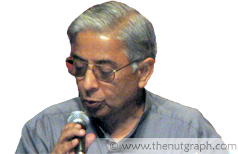 AFTER the 2008 general election, the majority of the 113 Members of Parliament (MPs) who replied to MP Watch: Eye on Parliament said they supported the concept of separation of powers among the three branches of government. To the question “Do you believe in the separation of powers among the executive, Parliament and judiciary?”, 108 out of the 113 gave a clear “yes”.
AFTER the 2008 general election, the majority of the 113 Members of Parliament (MPs) who replied to MP Watch: Eye on Parliament said they supported the concept of separation of powers among the three branches of government. To the question “Do you believe in the separation of powers among the executive, Parliament and judiciary?”, 108 out of the 113 gave a clear “yes”.
But those who answered in the affirmative differed in their views on the extent to which separation of powers is practised in Malaysia. Forty-two MPs, or close to 40% of those who replied, said the concept was not practised fully, or that the reality in Malaysia was different from theory. Of this, 36 MPs were from the Pakatan Rakyat (PR), and six from the Barisan Nasional (BN).
Fifteen others felt that the concept was being practised, with some adding that there was room for improvement, and that clearer boundaries among the branches of government should be drawn.
Fifty-one MPs, while stating that they believed in the concept, did not specifically mention what they felt about the current situation. There were also MPs who gave ambiguous answers and did not comment clearly on whether they believed in the concept or not.
Executive too powerful
Lack of Parliamentary and judicial independence, and a too-powerful executive were the top examples cited by MPs when commenting on the state of separation of powers in Malaysia. These were also cited by some MPs who were not among the 42 who had expressly criticised the present situation.
In giving these examples, MPs were largely divided along party lines, with a few exceptions. Nine MPs, all from the PR, said the judiciary was tarnished or suppressed. Fifteen MPs cited weaknesses in Parliament, with several from the PR calling it a “rubber stamp”. Of the 15, four were from BN: namely Bung Moktar Radin (Kinabatangan), Mohd Radzi Sheikh Ahmad (Kangar), Wan Junaidi Tuanku Jaafar (Santubong) and Ismail Kasim (Arau).
Some MPs suggested ways to have some degree of separation of powers between the executive and the legislative. These included giving independence to the speaker; abolishing the post of minister in charge of Parliament; recognising the role of the opposition; instituting select committees and a law-drafting committee; and making the Attorney General and the heads of anti-graft and election commissions answerable to Parliament.
One BN MP, Saifuddin Abdullah (Temerloh), was among eight MPs who spoke about the executive’s pervasive powers. Saifuddin said the relationship between the executive and the legislative should be reviewed.
“We sometimes see that the cabinet makes decisions without having to get prior approval from Parliament,” he said. He suggested that certain cabinet decisions could first be discussed in Parliament to “give recognition to the people’s voice”. He also suggested studying how the role of an MP who is concurrently a cabinet member could be made clearer in the interest of separation of powers.
Overall, MPs, even those who did not directly criticise the present situation, were nuanced in their replies. Some of those who said that separation of powers was being observed also called for it to be further strengthened; while others said it was challenging to navigate the “thin lines” separating the three branches of government. This suggests a tacit recognition that the reality is not ideal.

Check and balance
The MPs’ suggestions are indeed valid ways to promote greater separation of powers, says Universiti Teknologi Mara Emeritus Professor Datuk Dr Shad Saleem Faruqi. The constitutional law expert adds that there is nothing to stop proposals for parliamentary select committees and more from being implemented.
“Legally, all this is available. The Standing Orders of Parliament already permits committees to exist. The Federal Constitution provides for an independent judiciary. The problem is not the law or the institutions themselves, but the attitude of those in power. The law is as good as the people who administer them,” Shad notes.
However, Shad points out that the concept of strict separation in a Westminster parliamentary system does not exist anywhere in the world. The US federal government model is not a basis for comparison because it is an entirely different system.
“In all parliamentary democracies in the world, there is no strict separation between the executive and the legislative. Institutions may have many points of contact and may even share personnel and function. A more workable and pragmatic solution is to have mechanisms for check and balance.”
Shad adds that Article 43 of the Federal Constitution has such provisions, such as Clause 3, which requires cabinet to be responsible to Parliament. “But today, there is no check and balance. The executive has dominated and captured the legislative process,” Shad observes.
Turning point
The turning point after which check and balance between Parliament and the executive started to erode is hard to pinpoint. Shad believes the change is the result of at least two things that happened after Parliament was suspended, following the 13 May 1969 racial clashes, to allow the National Operations Council to rule with emergency powers.

When Parliament reconvened in 1971, the Federal Constitution’s scope on freedom of speech was amended, and the Sedition Act was applied to MPs. As such, MPs lost the privilege of immunity for certain issues raised in the House if they were spoken about in a manner deemed seditious. These issues were the special position of Malay Malaysians and bumiputera, Malay royalty, and the national language. “MPs were muzzled,” Shad says.
A second and far-reaching event was the Barisan Nasional (BN)’s continued two-thirds majority in Parliament, which was only broken again in 2008 after it was first broken in 1969. “The political composition of Parliament is a major factor in the erosion of check and balances. No law can change this, because it is a political issue where the executive is the majority in Parliament,” says Shad.
Shad suggests at least two things that could be done to move on from the present situation, provided there was political will: reintroduce an updated Parliamentary Services Act, and improve Parliament’s institutional capacity.
The first would see Parliament being independently funded and administered. The second would restore some degree of empowerment by equipping each MP with an office and staff for research, speech writing, and responding to constituency needs.
Concurring with most MPs that their counterparts in poorer countries in the region are better equipped, Shad adds, “We are not serious about our Parliament. We have training institutes for the other branches of government – the Judicial and Legal Training Institute (Ilkap) for the judiciary, and the National Institute of Public Administration (Intan) for civil servants.
“We give them internal courses and send them on scholarships, but we don’t give any education or training to our MPs. At the very least, we should have an institute of parliamentary affairs.” ![]()
This essay first appeared exclusively in Understanding the Dewan Rakyat, together with other analyses on how our government works. The book also contains the profiles of the current 222 MPs and how they and their parties would vote on key issues of democracy. The book was launched by Speaker of the House Tan Sri Pandikar Amin Mulia at the Dewan Rakyat on 23 March 2011. It is available at PusatLoyarBurok.


Wave33 says
We already know, it happened during the 22-years of regime control.
That is why we need to Ubah! Ini Kalilah!
New broom sweeps clean.